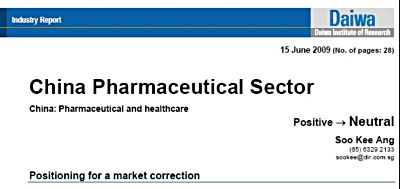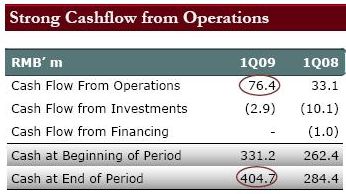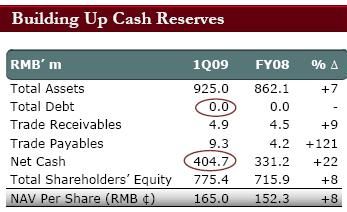
Daiwa report dated June 15 sees the STI declining to 1,623 points.
DAIWA INSTITUTE OF RESEARCH has lowered its call on China’s pharmaceutical sector to “neutral” from “positive” due to unjustifiably high share prices for many drug and healthcare firms.
The brokerage said that valuations in some areas have been “hyped up” of late, and Daiwa envisions a “steep correction” in the near term, and that pharmaceutical counters are not alone as a sector as regional bourses will likely see prolonged profit taking going forward after a substantial first-half rebound.
“We expect stock markets in markets in Asia to pull back considerably in the second half of this year followed by a recovery. In line with this scenario, we have reviewed our ratings and target prices for the China pharma stocks we cover to factor in their prospects in a potential market correction, and examine the impact of depressed market conditions on their share-price performances,” Daiwa said.
For the Hong Kong market, Daiwa sees the Hang Seng Index falling to 13,557 points (down 27.9% from the current level), before recovering to 17,625 points (down 6.2%) by the end of this year.
For the Singapore market, it sees the Straits Times Industrial Index declining to 1,623 points (down 31.9%), before rebounding to 1,932 points (down 18.9%) by the end of this year.
“In line with this scenario, we see the median 2009 P/E ratio for the China pharmaceutical sector moving from 9.3x currently, to 6.7x in the doldrums, and returning to 8.4x at the end of six months.”
Daiwa said the latter implies 9.7% downside at the end of six months, which would have underperformed the Hong Kong market, but outperformed the Singapore market. It added that it believes the prospects and defensiveness of the sector have been hyped up by the market, especially in Hong Kong, and that some stocks may see increased volatility during a market pull-back.
Over-the-counter counters: Sihuan Pharma and United Laboratories
However, amid any market correction, there are always those counters in any given sector that merit a more sanguine outlook due to better fundamentals and less downside valuation pressure.

Source: Sihuan
“We pick Sihuan Pharmaceutical and United Laboratories as the stocks to own during this period, given what we see as their sound fundamentals and reasonable valuations.”
Daiwa said that on a relative-return basis, Sihuan emerged top of its assessment, and it would expect the company’s share-buyback mandate, and strong near-term earnings performance to provide support for the share price in a market correction.
“On an absolute-return basis, we also expect Sihuan to be the best performer, but for the gap between its absolute return, and those of United Labs, China Shineway and Wuyi International to be more in relative terms, due to their different benchmark indices (FSSTI for Sihuan, HSI for United, Shineway, and Wuyi).”
The brokerage also that that for the same reason, it maintains its “hold” rating for C&O Pharma despite what it see as its potential for significantly larger negative absolute returns compared with United and Shineway, due to its forecast of a larger decline in the FSSTI.

Source: Sihuan
“Notwithstanding this, we believe that investors seeking absolute returns should divest their holdings now, as we expect most of the pharmaceutical stocks that we cover to record negative returns over the next six months.”
Shineway, Wuyi: Prognosis far from stable
From a trading perspective, Daiwa said it expects the share-price volatility for Shineway and Wuyi to increase over the next six months. In particular, Shineway’s share price has surged dramatically in recent weeks, and appears overdue for a correction, in Daiwa’s estimation.
“The share prices of Shineway and Wuyi were also hyped up on issues like swine flu, where the increases in their market value outweighed the benefits, in our view. These may change if market sentiment turns cautious over the next six months.”
From a fundamental perspective, Daiwa said it likes United Labs and Shineway for their “dominant market positions” in the antibiotics and Modern Chinese Medicine (MCM) segments, respectively, in China.
“In our view, investors should have positions in the market leaders, if they wish to ride on the upside for the pharmaceutical sector over the long run. Nevertheless, we would only recommend picking up these stocks on any share-price weakness, and believe such an opportunity may surface over the next six months.”
Prevention the best medicine
Daiwa said it believes that investors tend to be selective in their reaction to news depending on market sentiment, adding that the recent swine-flu outbreak coincided with a market run, and its impact was either ignored, or used to play up certain stocks.
During a market correction when sentiment turns cautious, the brokerage expects the market to take a more serious look at swine flu.
“The Singapore market, for example, hit a five-year low in 2003 when the economic slowdown coincided with the outbreak of SARS. The share prices of certain stocks, such as Shineway and Wuyi, have surged since the outbreak of the swine.”
A recent article from the China’s Ministry of Health recommended, among others, Huo Xiang Zheng Qi and Qing Kai Ling Injection -- both Shineway product -- for the treatment of swine flu. It also recommended antibiotics, but the share prices of United Labs and C&O have not seen the same kind of reaction.
“Thus, we conclude that the market has either over-reacted with Shineway and Wuyi, or under-reacted with United Labs and C&O. We favor the former, and expect the share prices to Shineway and Wuyi to see steeper corrections during a market downturn,” Daiwa said.
Stimulus package: Just what the doctor ordered?
Daiwa said it expects the ongoing healthcare reforms in China, which include a target for government spending of 850 bln yuan over the next three years, to be beneficial for pharmaceutical companies generally over the long term.
However, there are many near-term uncertainties, including the method of selection and pricing for drugs in the proposed Basic Medicine Catalogue, and the implementation of the two invoice system.
These uncertainties, coupled with the slow implementation by the government, have caused hospitals to become more cautious about purchasing drugs, and this in turn has affected the sales of many drugmakers.
“We expect more clarity on the reforms to have an impact – although not necessarily a positive one – on the share prices of pharmaceutical companies. For example, rigid and widespread implementation of the two-invoice system may have a negative impact on Sihuan’s future earnings growth.”

